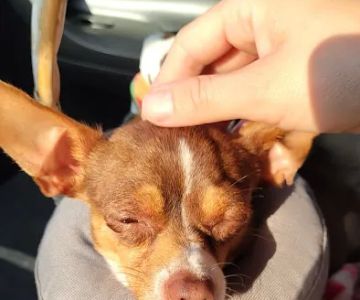Treating a Pet's Dry Nose: Causes, Remedies, and Preventative Care
As a pet owner, it’s easy to worry when you notice your dog or cat’s nose becoming dry, cracked, or flaky. The nose is an important part of their body, and any changes in its appearance or texture can indicate health issues. A dry nose in pets is quite common, but it’s essential to understand what might be causing it and how to provide effective treatment. In this article, I’ll share my experience and knowledge of dealing with a dry nose in pets, offering tips on how to keep your furry friend's nose healthy and hydrated.
1. Understanding the Causes of Dry Nose in Pets
A dry nose in pets can be caused by a variety of factors, ranging from environmental conditions to underlying health concerns. It’s important to know when a dry nose is simply a temporary condition and when it might signal a more serious issue.
Environmental Factors: One of the most common causes of a dry nose is the environment your pet is in. Hot, dry air or excessive exposure to sunlight can lead to dehydration of the nasal passages, making your pet’s nose feel dry and cracked. If your pet spends a lot of time outside in hot weather or in air-conditioned environments, this might be the culprit.
Dehydration: Just like humans, pets need to stay hydrated. A lack of water intake can lead to dry skin, including the nose. If your pet’s dry nose is accompanied by other signs of dehydration, such as lethargy or sunken eyes, it’s important to address hydration issues immediately.
Health Conditions: Sometimes, a dry nose can be a sign of an underlying health issue. Infections, autoimmune diseases, and even allergies can cause a pet’s nose to become dry. If your pet’s dry nose persists for more than a few days or is accompanied by other symptoms like nasal discharge, fever, or loss of appetite, it’s time to visit your vet.
2. Remedies for Treating a Pet’s Dry Nose
If your pet’s dry nose is due to environmental factors or mild dehydration, there are several remedies you can try at home to help restore moisture to their nose.
1. Hydrate Your Pet: Ensure that your pet has constant access to fresh water. Dehydration can easily be prevented by encouraging your pet to drink more. For pets who are picky drinkers, consider adding ice cubes to their water or offering wet food to increase their hydration levels.
2. Use a Pet-Safe Nose Balm: Pet-safe balms and oils can be applied to your pet’s dry nose to help soothe and rehydrate the area. These products are formulated specifically for pets, making them safe for their sensitive skin. Look for balms with natural ingredients like beeswax, coconut oil, or shea butter, which can help lock in moisture.
3. Humidify the Air: If your pet spends a lot of time indoors, using a humidifier can help restore moisture to the air, preventing your pet’s nose from drying out. This is especially helpful during winter months when indoor heating can strip the air of moisture.
4. Avoid Overexposure to Sunlight: Just like humans, pets can get sunburned. If your pet spends a lot of time outdoors, make sure they have access to shaded areas to protect their nose from harsh UV rays. Applying pet-safe sunscreen to their nose can also help prevent dryness caused by sun exposure.
3. When to Visit the Vet
While a dry nose is often harmless, there are times when you should consult a vet. If your pet’s dry nose is persistent, accompanied by other symptoms, or caused by a health issue, professional veterinary care is needed.
Signs to watch for include:
- Persistent dry or cracked nose that doesn’t improve with home remedies
- Presence of nasal discharge or bleeding
- Changes in appetite, energy levels, or behavior
- Swelling or sores around the nose
If you notice any of these symptoms, it's best to seek veterinary care to rule out any serious underlying conditions.
4. Preventative Measures for Maintaining a Healthy Pet Nose
Prevention is always better than treatment, and by taking a few simple steps, you can keep your pet’s nose healthy and hydrated year-round.
1. Regular Grooming: Keeping your pet clean and well-groomed helps to prevent skin issues that can affect the nose. Regular baths and brushing can help remove dirt and debris that could irritate the skin.
2. Provide a Balanced Diet: A healthy diet plays a significant role in your pet’s overall well-being. Make sure your pet is eating high-quality food that supports skin health, including vitamins and fatty acids that can help keep their skin hydrated.
3. Regular Vet Checkups: Regular veterinary visits can help detect health issues before they become serious. Ensure that your pet gets routine checkups to monitor their overall health and address any potential concerns early on.
5. When to Seek Emergency Care for a Dry Nose
In rare cases, a dry nose can indicate an emergency situation, especially if the dry nose is accompanied by rapid breathing, signs of shock, or other serious symptoms. If your pet shows signs of distress or a sudden change in behavior, it’s important to contact your veterinarian or an emergency pet hospital immediately.
Conclusion: Keeping Your Pet's Nose Healthy and Hydrated
While a dry nose in pets is often temporary and can be easily treated with home remedies, it's important to keep an eye on the condition of your pet’s nose to ensure their overall health. If the dry nose persists or is accompanied by concerning symptoms, don’t hesitate to seek professional veterinary care. By staying proactive and following the remedies and tips mentioned above, you can help your pet maintain a healthy, hydrated nose and enjoy many more happy days together.
Looking for more pet health advice or need a consultation? Visit Hidden Brook Veterinary for expert care and guidance.











